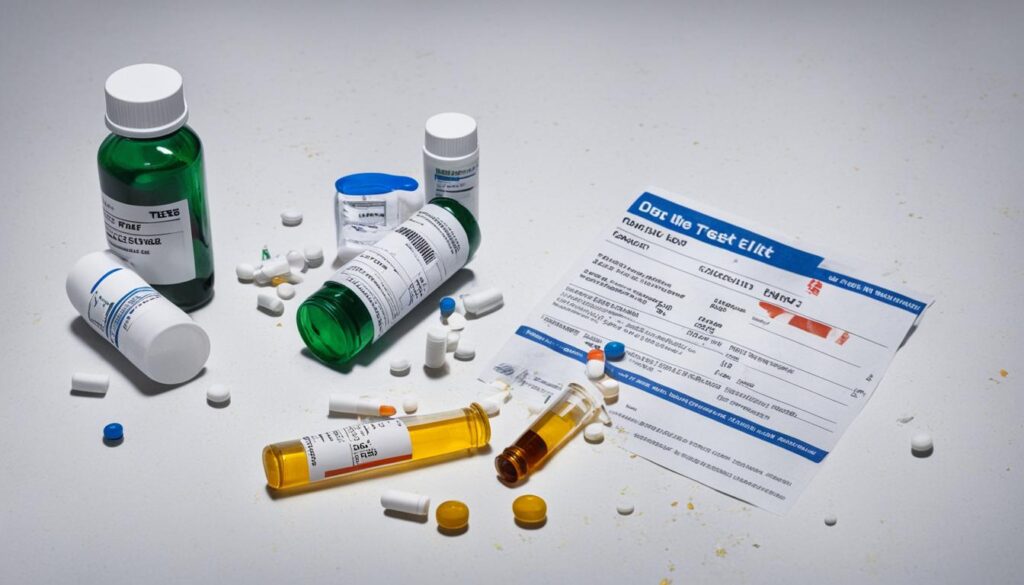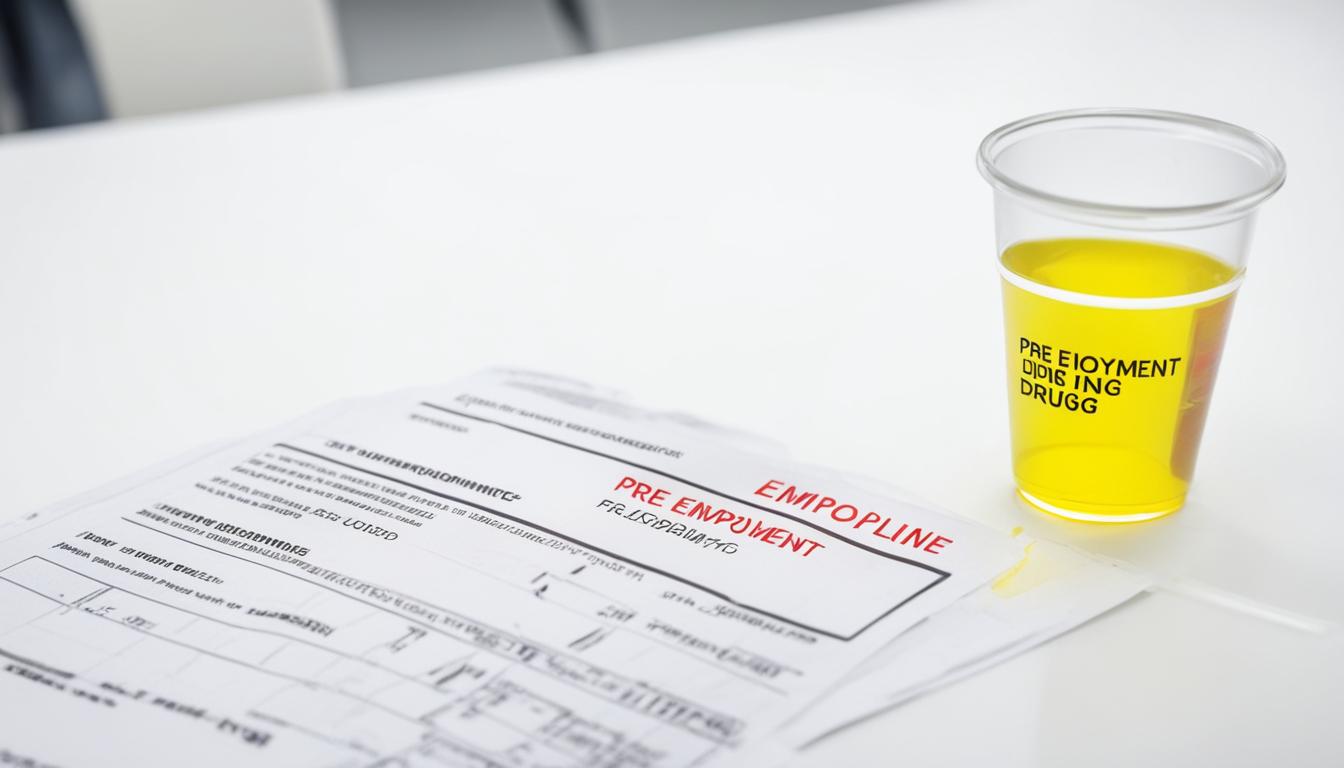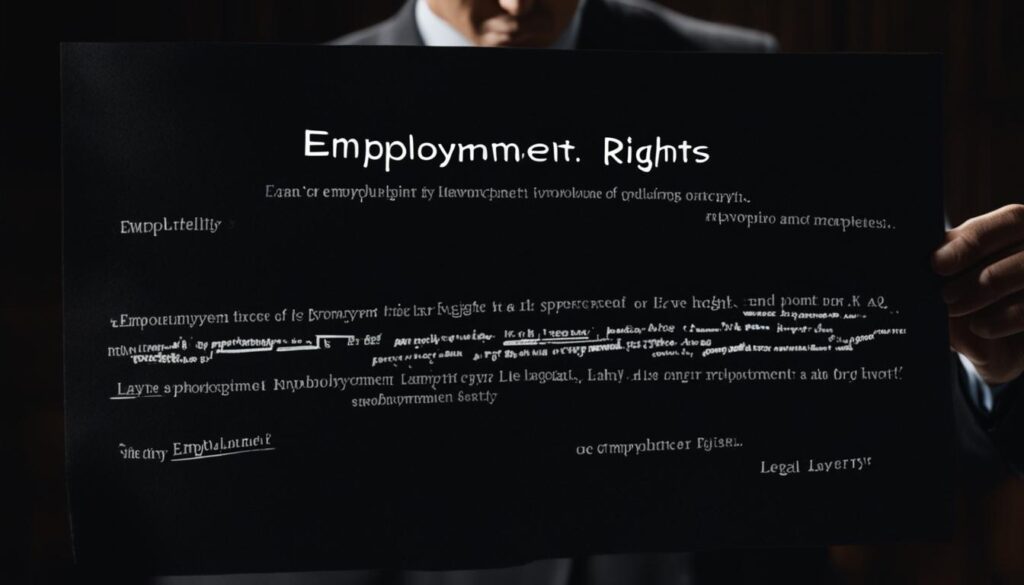When it comes to pre-employment drug testing, failing a drug test doesn’t necessarily mean the end of your employment opportunities. Companies have different drug testing policies in place and must comply with federal and state laws. The hiring process involves various steps, including pre-employment screening, and drug test results are just one factor that employers consider.
Employers use different types of drug tests, such as saliva, urine, hair follicle, and blood tests, to detect drug use. Each test has its own detection period and level of accuracy. Understanding these methods can help you better navigate the hiring process and potential workplace drug testing.
Key Takeaways:
- While failing a pre-employment drug test can be a setback, it doesn’t automatically disqualify you from being hired.
- Drug testing policies and procedures vary from company to company, so it’s important to familiarize yourself with the specific policies of the organization you’re applying to.
- Pre-employment screening involves multiple steps, including drug testing, and employers consider a variety of factors when making hiring decisions.
- Different types of drug tests have different detection periods and levels of accuracy.
- Understanding your rights and responsibilities, as well as any available treatment options, can help you navigate the aftermath of a failed drug test.
Types Of Failed Drug Tests
Employers use different types of drug tests to determine if someone has used illicit drugs or controlled substances. These tests play a crucial role in drug screening during the hiring process and workplace drug testing. Four common types of drug tests include saliva testing, urine testing, hair follicle testing, and blood testing.
Saliva Testing
Saliva testing involves collecting a sample of saliva to detect the presence of drugs. It has a relatively short detection period of up to 48 hours, making it suitable for identifying recent drug use. While saliva tests may be less accurate compared to other methods, they are harder to tamper with, ensuring the integrity of the results.
Urine Testing
Urine testing is the most commonly used method for drug screening. It involves analyzing a urine sample for the presence of drugs. Urine tests are non-invasive and can detect both recent and historic drug use, providing a comprehensive overview of an individual’s drug consumption patterns.
Hair Follicle Testing
Hair follicle testing is a highly reliable method that can identify substances used up to 90 days earlier. During this type of test, a small sample of hair is collected and analyzed to detect drug metabolites. Although hair follicle testing offers an extensive detection window and is difficult to adulterate, it tends to be more costly than other types of drug tests.
Blood Testing
Blood testing is another method used to detect recent or current drug use. This type of test involves analyzing a blood sample taken from an individual. Blood tests are typically more accurate than other methods, but they are also more expensive and invasive.
Employers choose the appropriate type of drug test based on factors such as the desired detection window, cost, accuracy, and the specific needs of their organization. Understanding the different types of drug tests and their capabilities can help both employers and job seekers navigate the drug screening process effectively.
How Often Do People Fail Drug Tests?
In 2022, the chances of failing a drug test among the US combined workforce were 4.6%. This data highlights the prevalence of positive drug tests and raises concerns about drug use trends in various industries. Positive drug tests reached their highest rate since 2001, showing a significant 30% increase from previous years. It is crucial to analyze this drug test data to gain insights into the current landscape and identify areas of concern.
Among federal employees in safety-sensitive roles, the use of marijuana, amphetamines, and cocaine has increased, further emphasizing the need for comprehensive drug testing policies in workplaces. These trends indicate that drug use is not limited to specific demographics or industries but can affect individuals in various roles and positions.
It is essential to consider the context surrounding a positive drug test result. While drug use trends may be concerning, it is important to recognize that not all positive results indicate illegal drug use. Prescription medications, over-the-counter drugs, and certain substances can lead to false positives on drug tests. It is crucial for both employers and employees to be aware of these factors and have a clear understanding of the drug testing process.
Drug testing policies should be implemented to ensure a safe and drug-free work environment. Regular monitoring, random drug testing, and comprehensive guidelines can help address drug use trends and mitigate risks associated with substance abuse in the workplace. By staying informed about drug test data and positively addressing drug use concerns, employers and employees can work together to maintain a productive and safe work environment.
What Happens After A Failed Pre-Employment Drug Test?
If you fail a pre-employment drug test, it’s natural to feel concerned about the consequences. While it can be alarming, it’s important to understand the next steps in the process and the potential outcomes.
When a job offer is contingent upon passing a drug test, employers have the right to rescind the offer if the candidate fails the test. However, it’s crucial for employers to follow the appropriate drug testing laws set by both federal and state regulations. Each state may have different guidelines regarding drug testing, so it’s essential to be aware of the specific laws and policies in your state.
To navigate the aftermath of a failed pre-employment drug test, start by reviewing your prospective employer’s drug testing policy. This policy will outline the consequences of a positive result and may provide information on possible next steps or avenues for explanation.
Keep in mind that the consequences of failing a drug test can vary depending on the state and employer. Some employers may have a zero-tolerance policy and immediately rescind the job offer, while others may offer an opportunity to explain the positive result. Understanding your rights and the company’s policies will help you better navigate the situation and determine your next course of action.

Remember that failing a pre-employment drug test does not necessarily mean the end of your employment opportunities. It’s important to communicate openly with your prospective employer, express any concerns or explanations, and understand the potential alternatives or options available to you.
In the next section, we will discuss what happens after a failed employee drug test at work and the potential consequences and actions that may follow.
What Happens After A Failed Employee Drug Test At Work?
In some workplaces, random or periodic drug testing may be conducted. This is an important measure implemented by employers to ensure a safe and drug-free work environment. If an employee fails a drug test, the consequences and next steps will depend on company policies and applicable federal and state guidelines.
For government-regulated workplaces, such as those in the transportation industry, there are specific rules and regulations regarding drug testing. These industries prioritize the safety and well-being of employees and the general public, necessitating strict enforcement of drug testing protocols.
If an employee fails a drug test at work, it’s essential to understand the potential consequences. Employers may have policies in place that outline the actions they will take in such situations. These consequences can range from disciplinary actions, such as temporary suspension or termination, to mandatory drug counseling or rehabilitation programs.
However, it’s important to note that in some states, employees have the right to explain a failed drug test before any disciplinary action is taken. This gives employees the opportunity to provide valid explanations or demonstrate mitigating circumstances that may explain the positive test results. Employers may consider these explanations and determine the appropriate course of action.
In some cases, employers may also provide employees who fail a drug test with the opportunity to seek treatment or counseling. This approach recognizes that substance abuse issues are complex and may require professional intervention. By offering support and resources, employers can help their employees overcome challenges related to drug misuse.
Benefits of Workplace Drug Testing
- Promotes safety and reduces the risk of accidents in the workplace
- Ensures compliance with federal and state regulations
- Maintains productivity and efficiency
- Fosters a healthier work environment
Implementing random or periodic drug testing in the workplace serves several crucial purposes. By deterring drug use and ensuring a drug-free environment, employers can safeguard the well-being of their employees and minimize potential risks. It also promotes fairness by establishing a level playing field for all employees where drug use is strictly prohibited.
Remember, failing a drug test at work does not necessarily mean the end of employment. Employers should approach these situations with compassion and consideration for their employees’ well-being. Open communication between employers and employees is vital to understanding the reasons for drug test failures and finding appropriate resolutions.
Workplace drug testing plays a significant role in maintaining a safe and productive work environment. By establishing clear drug testing policies and providing support for employees, employers can further ensure the well-being of their workforce.
What Makes People Fail A Drug Test?
There are a multitude of factors that can lead to a failed drug test. One of the most obvious reasons is drug or alcohol consumption. If you have recently used illicit drugs or consumed alcohol, it can show up in your test results.
However, it’s important to note that false positives can also occur for various reasons. Certain medications, foods, and substances can trigger a false positive on a drug test. For example, some over-the-counter medications, like cold and allergy remedies, may contain ingredients that mimic drugs of abuse. Additionally, consuming certain foods or using products like mouthwash or CBD oil that contain trace amounts of THC can result in a false positive for marijuana.
To mitigate the risk of false positives, it’s essential to be aware of any substances that may trigger them and disclose this information to your employer before the drug test. By communicating openly about any medications or products you are using, you can ensure that the test results accurately reflect your situation.
Common Reasons for Failed Drug Tests:
- Drug or alcohol consumption
- Certain medications
- Foods and substances that contain trace amounts of drugs
How Long Do Failed Drug Screenings Stay On Record?
The duration that failed drug screenings stay on record can vary depending on the employer. In general, the results of failed drug screenings are kept confidential between the company and the individual who took the test. This ensures the privacy and confidentiality of drug test results.
However, for certain positions regulated by the Department of Transportation, such as commercial drivers, drug test results may be recorded in the Drug and Alcohol Clearinghouse. The Clearinghouse is a secure online database that provides real-time information about commercial driver’s license (CDL) holders’ drug and alcohol program violations. It helps employers, the Federal Motor Carrier Safety Administration (FMCSA), state driver licensing agencies, and other authorized users identify and address drivers who are not in compliance with federal drug and alcohol use and testing regulations.
Under the Department of Transportation regulations, drug test results stored in the Clearinghouse are retained for a specific period of time. According to these regulations, failed drug test records may be stored in the Clearinghouse for up to five years.
Candidates who apply for jobs in safety-sensitive positions regulated by the Department of Transportation may need to provide consent for prospective employers to access their drug test records in the Clearinghouse as a part of the hiring process. This allows employers to verify the candidate’s compliance with drug and alcohol testing regulations and make informed decisions regarding their suitability for safety-sensitive positions.
It’s important for individuals to be aware of the confidentiality of drug test results and the potential inclusion of failed drug screening records in the Drug and Alcohol Clearinghouse for certain positions regulated by the Department of Transportation. By understanding the retention period and the need for consent in accessing these records, both employers and candidates can navigate the hiring process and comply with relevant regulations.
Conclusion
Failing a pre-employment or employee drug test does not automatically mean the end of your employment prospects. Many employers have policies in place that allow for retesting or an explanation of the results. It’s crucial for both employers and employees to follow proper procedures and comply with federal and state laws governing drug testing in the workplace.
If you find yourself in a situation where you’ve failed a drug test, it’s important to understand your rights and responsibilities. Open and honest communication with your employer and medical review officers can help clarify any potential false positives and find suitable resolutions.
Additionally, exploring available treatment options is a proactive approach that may help improve future employment prospects. Though the consequences of failing a drug test can vary, taking the initiative to address any substance abuse issues demonstrates personal growth and a commitment to maintaining a drug-free workplace.
FAQ
Can you still be hired if you fail a pre-employment drug test?
Yes, failing a pre-employment drug test doesn’t necessarily mean you won’t be hired. Employers must follow proper procedures and comply with federal and state laws.
What are the different types of drug tests employers use?
Employers can use various types of drug tests, including saliva testing, urine testing, hair follicle testing, and blood testing.
How often do people fail drug tests?
The chances of failing a drug test in the US combined workforce were 4.6% in 2022, with increases in positive tests for employees in safety-sensitive roles.
What happens after a failed pre-employment drug test?
If a job offer is contingent upon passing a drug test, employers may rescind the offer if the candidate fails the test. However, employers must comply with federal and state pre-employment drug testing laws.
What happens after a failed employee drug test at work?
The consequences of failing a drug test at work depend on company policies and applicable federal and state guidelines. Some government-regulated workplaces have specific rules regarding drug testing.
What makes people fail a drug test?
Drug or alcohol consumption can result in a positive test. Certain medications, foods, and substances like mouthwash or CBD oil can also lead to false positives.
How long do failed drug screenings stay on record?
The duration that failed drug screenings stay on record can vary depending on the employer. In general, the results are kept confidential between the company and the individual who took the test.
Conclusion
Failing a pre-employment or employee drug test does not necessarily mean the end of employment opportunities. Employers may have options for retesting or explaining the results, and there may be treatment options available. It’s important to communicate with the employer and understand your rights and responsibilities.




